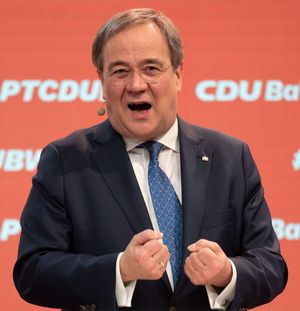By year’s end, Armin Laschet could well be Europe’s most powerful man. He is a seasoned politician—prudent, pliable, patient and persistent. These qualities helped him become the head of Germany’s ruling centre-right Christian Democratic Union (CDU), a position formerly held by Angela Merkel. She steps down in September after 16 years as German chancellor. A Merkel-loyalist, Laschet promises to continue her legacy: a robust Germany, a strong European Union and inclusive centrism. Merkel goes; long live Merkelism.
Affable and jovial, Laschet, 59, was prudent when party heavyweights criticised each other and especially Merkel’s welcoming refugee policy in 2015. He patiently overcame political defeats to eventually become prime minister of North Rhine-Westphalia, Germany’s most populous state, whose capital is Düsseldorf. In the party leadership race, he narrowly defeated his sharp-tongued rival, Friedrich Merz. A multi-millionaire lawyer, Merz is polarising because he is associated with big business and high finance. Academics and socialist politicians have exposed his lobbying activities and conflicts of interest. Despite his defeat, Merz lobbied Merkel to make him economy minister. Merkel snubbed him, saying she was not planning a reshuffle.
If the CDU wins the national elections in September, Laschet would succeed Merkel as German chancellor. But the pandemic disrupts political dynamics. Merz may not be Laschet’s sole challenger. Laschet’s ally, Jens Spahn, 41, may emerge a contender. As health minister, the openly gay Spahn gained high visibility during the pandemic.
External opponents also lurk. Recognising this, Laschet said in his victory speech at the digital conference of 1,001 party delegates that elected him: “We want to make sure the next chancellor is from this party.”
A potential external challenger is Markus Söder, a former journalist and serving state prime minister like Laschet. The Bavarian premier heads the CDU’s sister party and coalition ally, the Christian Social Union (CSU). Opinion polls show that 43 per cent of Germans want Söder as the next chancellor, while only 12 per cent prefer Laschet. Again, the pandemic accounts for this polarity in popularity. Söder won praise for his tough handling of the pandemic in Bavaria, while Laschet’s popularity sank because he flip-flopped between lax and tight restrictions, culminating in outbreaks in his state. Laschet is also labelled Russlandversteher, a derogatory term for people who are soft on Vladimir Putin’s Russia.
Who becomes the next chancellor depends on the September election results. Laschet’s CDU is still Germany’s largest party, commanding 36 per cent of votes. The party has ruled for 52 of the last 72 years. Still, it needs partners to form a majority government. The CDU’s main ally, the Socialist Democratic Party, will not continue the partnership because it has damaged it politically. The party is down to 15 per cent in opinion polls, with both the far right and the Greens overtaking it. To Laschet’s advantage, the Greens, who now poll 20 per cent of votes, have an uneasy if not hostile relationship with Söder’s pro-business CSU. Experts predict a CDU-Greens coalition. Tortuous negotiations can take six months to culminate in an agreement.
Laschet is cannily wooing the Greens. On winning the party elections, he said, “After Covid, the country needs to modernise and press ahead with green transformation.” Critics cattily noted that in his 10-point “vision for the future”, Laschet mentions climate only once. It appears in the heading ‘A good climate for entrepreneurial spirit and innovation’.
Pliability, euphemistically called pragmatism, is also the trait of a seasoned politician.


